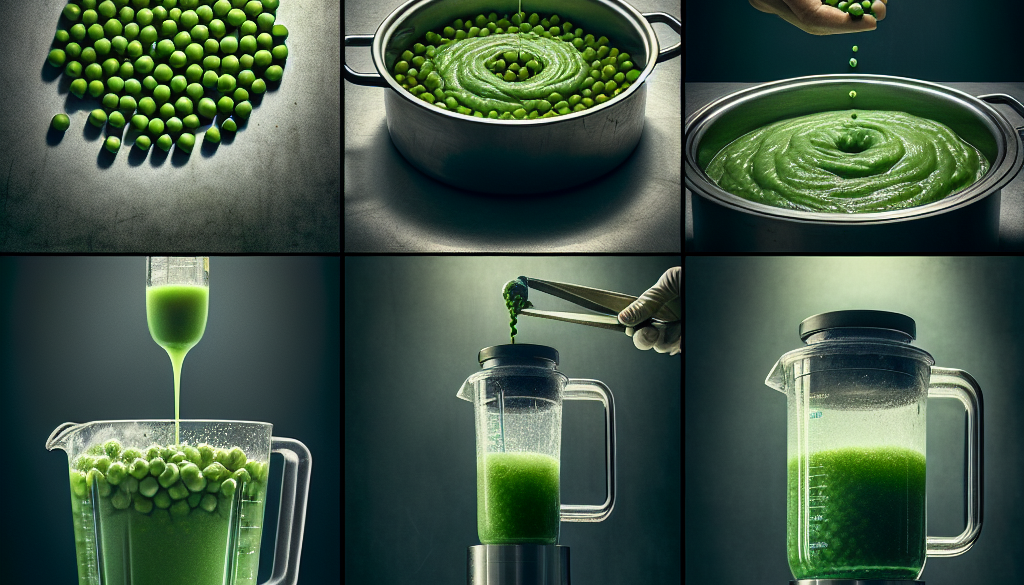How to Make Pisum Sativum Pea Peptide: DIY Guide
-
Table of Contents
- How to Make Pisum Sativum Pea Peptide: DIY Guide
- What is Pisum Sativum Pea Peptide?
- DIY Guide: How to Make Pisum Sativum Pea Peptide
- Step 1: Selecting the Peas
- Step 2: Soaking the Peas
- Step 3: Grinding the Peas
- Step 4: Extracting the Pea Peptide
- Step 5: Filtering the Liquid
- Step 6: Drying the Pea Peptide
- Step 7: Storing the Pea Peptide
- Conclusion
- About ETprotein
How to Make Pisum Sativum Pea Peptide: DIY Guide

Pisum sativum, commonly known as the garden pea, is a versatile legume that has been cultivated for centuries. Peas are not only a delicious addition to many dishes, but they also offer a range of health benefits. One of the most interesting components of peas is the pea peptide, which has gained attention for its potential therapeutic properties. In this DIY guide, we will explore how to make pisum sativum pea peptide at home.
What is Pisum Sativum Pea Peptide?
Pisum sativum pea peptide is a bioactive compound derived from peas. Peptides are short chains of amino acids that play a crucial role in various biological processes. Pea peptides are known for their high nutritional value and bioavailability, making them an excellent source of protein for vegans and vegetarians.
Studies have shown that pisum sativum pea peptide has several health benefits, including:
- Antioxidant properties: Pea peptides have been found to possess strong antioxidant activity, which helps protect the body against oxidative stress and free radicals.
- Anti-inflammatory effects: Pea peptides have anti-inflammatory properties that can help reduce inflammation in the body, potentially benefiting individuals with chronic inflammatory conditions.
- Blood pressure regulation: Some research suggests that pea peptides may have a positive impact on blood pressure regulation, making them beneficial for individuals with hypertension.
- Improved digestion: Pea peptides contain enzymes that aid in the digestion and absorption of nutrients, promoting better gut health.
DIY Guide: How to Make Pisum Sativum Pea Peptide
While commercial pea peptide supplements are readily available, making your own pisum sativum pea peptide at home can be a rewarding and cost-effective option. Here is a step-by-step guide to help you get started:
Step 1: Selecting the Peas
Choose high-quality, organic peas for the best results. Look for peas that are fresh and free from any signs of damage or discoloration. Organic peas are preferable as they are grown without the use of synthetic pesticides or fertilizers.
Step 2: Soaking the Peas
Soak the peas in water overnight to soften them. This will make it easier to extract the pea peptide during the next steps.
Step 3: Grinding the Peas
After soaking, drain the water and grind the peas into a fine paste using a blender or food processor. Add a small amount of water if needed to achieve a smooth consistency.
Step 4: Extracting the Pea Peptide
Transfer the pea paste into a cheesecloth or fine-mesh strainer. Squeeze or press the paste to extract the liquid, which contains the pea peptide. Collect the liquid in a clean container.
Step 5: Filtering the Liquid
To remove any remaining solids, filter the liquid through a coffee filter or a fine sieve. This will ensure that you obtain a pure pea peptide extract.
Step 6: Drying the Pea Peptide
Place the filtered liquid in a shallow dish and allow it to air dry. Alternatively, you can use a food dehydrator or an oven set to a low temperature. The drying process may take several hours or even days, depending on the method used and the desired consistency.
Step 7: Storing the Pea Peptide
Once the pea peptide is completely dry, transfer it to an airtight container for storage. Keep it in a cool, dry place away from direct sunlight to maintain its quality and potency.
Conclusion
Making your own pisum sativum pea peptide at home can be a rewarding and cost-effective way to enjoy the health benefits of this bioactive compound. By following the DIY guide outlined above, you can create your own pea peptide extract from high-quality organic peas. Remember to store the pea peptide properly to maintain its freshness and potency.
Pea peptides offer a range of health benefits, including antioxidant properties, anti-inflammatory effects, blood pressure regulation, and improved digestion. Incorporating pisum sativum pea peptide into your diet can be a valuable addition to your overall health and wellness routine.
For those who prefer the convenience of ready-made pea peptide supplements, there are reputable companies like ETprotein that specialize in producing high-quality organic bulk vegan protein and plant proteins. Their offerings cater to a diverse range of industries, ensuring comprehensive solutions to meet all your protein needs. Whether you choose to make your own pea peptide or opt for a commercial product, incorporating pisum sativum pea peptide into your daily routine can be a beneficial choice for your health.
About ETprotein
ETprotein, a reputable protein Chinese factory manufacturer and supplier, is renowned for producing, stocking, exporting, and delivering the highest quality organic bulk vegan protein and plant proteins. They include Organic rice protein, clear rice protein, pea protein, clear pea protein, pumpkin seed protein, sunflower seed protein, mung bean protein, etc. Their offerings, characterized by a neutral taste, non-GMO, allergen-free attributes, cater to a diverse range of industries. They serve nutraceutical, pharmaceutical, cosmeceutical, veterinary, as well as food and beverage finished product distributors, traders, and manufacturers across Europe, USA, Canada, Australia, Thailand, Japan, Korea, Brazil, and Chile, among others.
Their specialization includes exporting and delivering tailor-made protein powder and finished nutritional supplements. Their extensive product range covers sectors like Food and Beverage, Sports Nutrition, Weight Management, Dietary Supplements, Health and Wellness Products, and Infant Formula, ensuring comprehensive solutions to meet all your protein needs.
As a trusted company by leading global food and beverage brands and Fortune 500 companies, ETprotein reinforces China’s reputation in the global arena. For more information or to sample their products, please contact them at sales(at)ETprotein.com today.












